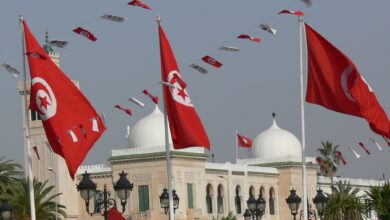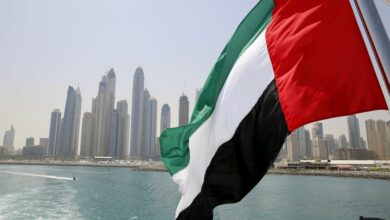Tunis–Popular protests in Tunisia continued for the 11th straight day on Sunday, against the backdrop of heated confrontations with police in the governorate of Sidi Bouzid, some 210 km south of Tunis, where a young unemployed man set himself on fire to protest deteriorating socio-economic conditions.
A protest march was held on Saturday in Muhammad Ali Square in central Tunis, in which hundreds of trade unionists, students and human rights activists supported demands by the people of Sidi Bouzid for job opportunities and social justice.
Protesters carried banners denouncing "tyranny and government corruption." At one point they managed to penetrate a tight security cordon and made their way to Al-Monagi Selim Street, where they demonstrated for a half an hour before being dispersed by police.
Additional demonstrations were reported in several other cities. A number of people staged protests in the city of Jelma to demand that the police siege on Sidi Bouzid be lifted.
According to labor union sources, bloody confrontations also took place in the village of Al-Itizaz near Sidi Bouzid, while scores of women on Sunday staged demonstrations in the city of Al-Mazouna to demand the release of those detained in the riots.
Another demonstration was held in the southern city of Qardan. Police also clashed with demonstrators in the city of Safaqis, where the latter had been demonstrating before the General Union of Tunisian Workers (GUTW), the country’s only trade union.
Protests also broke out in the city of Madnin, and in front of the Tunisian consulate in Paris.
The popular uprising erupted after Muhammad Bouazizi, 26, attempted to commit suicide on 17 December by setting himself alight in front of the Sidi Bouzid governor’s office after failing to find a job. The act of desperation triggered protests in several cities, especially after one protester was shot by police in the city of Manzel Bouziane. An official source at the Tunisian Ministry of Interior said police had opened fire in self defense.
In an attempt to contain the crisis, Tunisian Minister of Development Mohamed Nouri Jouini held a meeting in Sidi Bouzid, at which he announced the launch of several projects–worth a total of US$15 million–and distributed financial grants and donations to 750 local families. He also said the government had accepted some 1300 job applications that had been submitted by local university graduates.
Mohamed Ghariani, secretary-general of the ruling Democratic Constitutional Rally Party, held a meeting last week in the troubled city, at which he denounced what he described as "attempts to exploit individual incidents to discredit the gains of the government."
According to media reports, however, very few party members attended the meeting. "The meeting, which was supposed to deliver a strong political message and calm things down, was feeble,” said journalist Ziad al-Hani.
Meanwhile, Al-Zaafouri, a spokesman for the Sidi Bouzid Commission for Citizenship and the Defense of Victims of Marginalization, said that the disturbances “were spontaneous and not incited by any political movement." He went on to point out that unemployment and poverty were responsible for the mounting anger among Sidi Bouzid’s young people.
According to a recent GUTW study, the city's poverty rate currently stands at 12.8 percent, while unemployment among female university graduates stands at 44 percent, compared to a national average of 19 percent. Unemployment among male graduates stands at 25 percent, meanwhile, compared to a national average of 13.4 percent.
“No one likes clashing with the authorities or destroying property," Al-Zaafouri said, stressing the importance of dialogue between the people and government representatives. “Since 1987, the region has spent US$2 billion on development, but only very few have benefited from it," he added, asserting that those responsible for administrative corruption and the waste of public funds must be brought to account.
Such street upheavals are a rare occurrence in Tunisia, which is tightly controlled by an authoritarian regime. Yet this has not prevented occasional social unrest, such as that which occurred in the Al-Hawd al-Mangani district in early 2008, or in the border city of Qardan this past summer.
No breakthroughs are expected in the coming days due to the repressive practices of the Tunisian government. According to eyewitnesses, police on Sunday arrested dozens of protesters in the city of Al-Meknasi near Sidi Bouzid. Many local homes and shops, meanwhile, have reportedly been looted by security agents.
Activist Essam al-Gharibi was reportedly kidnapped by police in front of his home to be released later hundreds of kilometers away. The incident prompted the Tunisian Communist Youth Union to demand a “serious and independent investigation” to prosecute those responsible for the act and others like it.
In a statement, Tunisia’s Democratic Progressive Party said that party member Wessam al-Saghir had been assaulted by plainclothes police officers for taking part in a peaceful demonstration in Muhammad Ali al-Hami Square. The statement went on to allege that police had raided the home of another party member in Safaqis before beating him and disabling his Internet connection.




